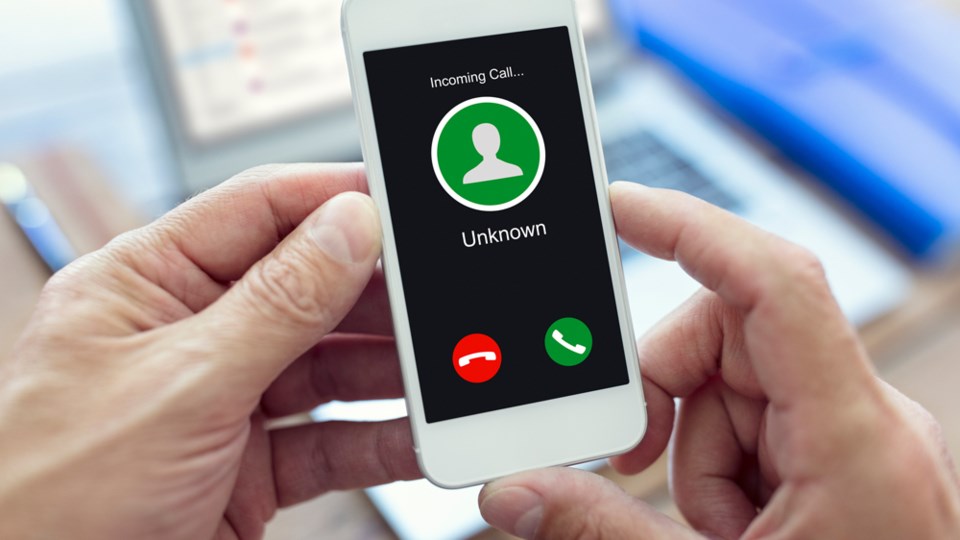For the many British Columbians who rely on the same mobile telephone for work and leisure, receiving a call from an unknown number may be tricky to deal with.
There might be a tendency to assume that a call from an “unknown number” will ultimately yield a message that would be worthy of attention or a reply. In many cases, it does not.
In 2019, Research Co. and Glacier Media reviewed just how much the province’s residents were being inconvenienced by three types of calls and messages. At the time, only 27% of British Columbians with a mobile phone said they had not been contacted by these unfamiliar callers or senders. When we re-asked this question last month, the proportion of unhindered cell phone users stayed at roughly the same level (28%).
On the one hand, the numbers are stable. More than a quarter of British Columbians with a mobile phone are happy to report that they are not being bothered on the phone by scammers or overeager political operatives. What has changed, and fairly dramatically, is the type of communication that is interrupting our daily activities.
Across the province, half of mobile phone users (50%) say they have received phone calls and/or phone messages from an individual purporting to represent a government entity, such as the Canada Revenue Agency (CRA). This represents a 15-point increase since we first asked in 2019.
The federal government has consistently warned Canadians about not taking these phone calls seriously. Important issues arising from fiscal matters are not solved over the phone and certainly do not include stern warnings about warrants, as some of the most bothersome messages have alleged.
The criminals responsible for these phone calls have become more sophisticated over time. The callers can modify their appearance on our mobile phone screens to provide the impression that they are legitimate (such as pretending that the call is coming from 1-800-O-Canada). This step can take an inexperienced person by surprise.
The threat of detention can be enough to make a person stay on the line and attempt to discuss the matter with whoever is on the other side, assuming that the person is in actuality a CRA employee. In reality, the CRA would not handle matters of this nature over the phone, and certainly would not request payment in the form of bitcoin or gift cards.
In years past, scammers attempted to fool people by attesting that a big tax refund would be on the way and that only some additional details would be needed. Now, they have switched the carrot for the stick with threats of impending arrest. Both scams have one goal: securing information that Canadians should not be sharing widely.
The scams can also arrive in the form of messages that only a small proportion of the province’s population can understand. In 2019, just over three in 10 British Columbians (31%) said they received phone calls and/or phone messages where an individual spoke Cantonese or Mandarin. This year, the proportion has increased drastically to 51%.
The scammers who do not rely on one of Canada’s official languages are operating mainly in Metro Vancouver, where 61% of mobile phone users recall receiving a call or message in Cantonese or Mandarin in the last two months. Still, the problem is also affecting significant proportions of residents of the Fraser Valley (51%) and Vancouver Island (46%).
The incidence of one type of message has fallen markedly. Only 18% of British Columbians received text messages asking if they support a specific party or policy sent by an individual they do now know. This is down from the 37% we reported on in 2019, when Canada was going through a federal election campaign.
British Columbians aged 18 to 34 are more likely to say they are getting unwanted messages of a political nature (23%) than their counterparts aged 35 to 54 (19%) and aged 55 and over (14%).
Unwanted calls and messages are a nuisance, but as the prevalence of political operations has died down, the number of calls from purported agencies and foreign languages has increased. Purveyors of spam emails know to cast a wide net in order to catch at least one person clicking on a URL that will leave them vulnerable.
A similar situation is ensuing with our mobile phones. The acquisition of lists of numbers and the indiscriminate use of automatic dialers has made it increasingly complicated to answer every call we get. This can affect how we engage with those we are actually looking forward to hearing from. A communication that used to be immediate must now await the delivery of a message to warrant picking up the phone. On scams, it is clear that things have gotten worse.
Mario Canseco is president of Research Co.
Results are based on an online study conducted from December 21 to December 23, 2021, among 800 adults in British Columbia. The data has been statistically weighted according to Canadian census figures for age, gender and region. The margin of error, which measures sample variability, is plus or minus 3.5 percentage points, 19 times out of 20.




